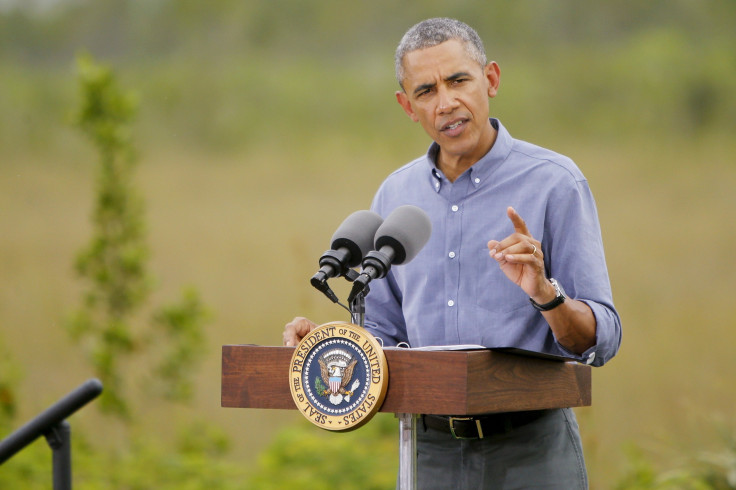Earth Day 2015: Obama Offers Thinly Veiled Criticism Of Florida's Unofficial Ban On Climate Change References

President Barack Obama on Wednesday offered thinly veiled criticism of Florida officials who informally banned the use of terms like “climate change” and “global warming” in state communications. The president was in the Florida Everglades this Earth Day to warn about the imminent dangers of sea level rise and other climate effects.
“Climate change can no longer be denied. It can’t be edited out. It can’t be omitted from the conversation,” Obama said. “And action can no longer be delayed. That’s why I’ve committed the U.S. to lead the world in combating this threat.”
Employees in Florida’s environment, transportation, health and water agencies in recent weeks have exposed an unofficial state policy to remove any references to man-made climate change from their work. A former employee at the South Florida Water Management District said “it was widely known” among state workers that certain references couldn’t go into reports. “They just wouldn’t make it through the editing process,” the source told the Florida Center for Investigative Reporting, which broke the story of Florida’s climate-reference ban in March.
“Simply refusing to say the words ‘climate change’ doesn’t mean that climate change isn’t happening,” Obama said during his address at Everglades National Park. “If you’ve got a coming storm, you don’t stick your head in the sand, you prepare for the storm. You make sure your communities are prepared for climate change.”
Florida Gov. Rick Scott, a Republican, declined a traditional invitation from the White House to meet Obama on the airport tarmac upon his arrival in Miami.
Florida is among the U.S. states most vulnerable to climate change. With sea levels projected to rise by 3 to 6 feet by the end of this century, most of Florida’s southern tip could soon be underwater -- including the Everglades. The wetland’s aquifers supply drinking water for 7 million residents in South Florida, more than a third of the state’s population. The park also is a critical staple in the state’s $82 billion tourism economy. “Climate change is threatening this treasure and the communities that depend on it. If we don’t act, there may not be an Everglades as we know it,” Obama said.
The president last month proposed to cut America’s greenhouse gas emissions by up to 28 percent below 2005 levels by 2025. The U.S. is one of nearly 200 countries expected to pledge national emissions reductions this year under the United Nations-led climate negotiations. Global leaders have agreed to meet in Paris in December to formalize a pact to fight climate change.
In the Everglades, Obama touted his administration’s proposal to spend $2.2 billion on wetlands restoration projects in Florida. He called on Congress to approve a $240 million slice of that pie for the next fiscal year. Obama also announced a $25 million initiative in public and private dollars to help restore national parks across the country. “In places like this, folks don’t have time ... to deny the effects of climate change. Folks are already busy dealing with it,” he said.
© Copyright IBTimes 2025. All rights reserved.




















